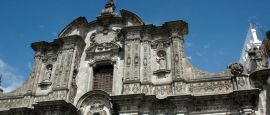Where to stay in Ecuador
Ecuador offers a broad range of accommodation options to suit different budgets and travel styles. In major cities such as Quito, Guayaquil and Cuenca, visitors will find international hotels, boutique properties and well-equipped business hotels. Many of these offer modern facilities, including Wi-Fi, restaurants and shuttle services.
In the highlands, particularly around cities like Cuenca, Otavalo and Baños, travellers can choose from charming guesthouses, family-run inns and small boutique hotels that blend traditional Andean architecture with contemporary comforts. These properties often provide a more personal experience and access to local culture.
The Amazon region is known for its eco-lodges, which range from rustic jungle cabins to upscale retreats with guided excursions, full board and expert naturalist staff. Access may involve boat travel, and electricity or internet may be limited, but the experience offers unique immersion in rainforest environments.
Along the coast, accommodation ranges from simple beach hostels to boutique surf lodges and larger resort-style hotels, especially in and around Montañita, Manta and Salinas. Many beachfront properties place emphasis on relaxation, nature and water activities.
Accommodation in the Galápagos Islands varies from small guesthouses to mid-range hotels and a handful of premium properties. Prices tend to be higher than on the mainland due to the islands' remote location and strict conservation regulations.
During national holidays and local festivals, popular destinations can fill quickly, so advance booking is recommended. Outside peak periods, travellers will find a wide choice of comfortable and affordable places to stay.
Camping is possible in several parts of Ecuador, particularly in national parks, protected reserves and highland areas. Popular locations for camping include Cotopaxi National Park, the Quilotoa region and various spots along the Avenue of the Volcanoes, where designated areas allow visitors to enjoy dramatic Andean landscapes. Basic facilities vary by site, and campers should be prepared for cold temperatures at higher altitudes, especially at night.
Wild camping is allowed in some rural or remote areas, but care should be taken to ensure that the site is safe, permitted and away from private property. Weather conditions can change rapidly in the mountains, and strong winds, rain or mist are common, so adequate gear and warm clothing are essential.
In the Amazon region, some lodges offer structured camping experiences or overnight jungle stays as part of guided tours. Independent camping is not generally recommended in the rainforest due to wildlife, humidity and accessibility issues, and is best arranged through reputable operators.
Campers should always follow Leave No Trace principles, respect local communities and avoid lighting fires in protected areas. With proper preparation, camping offers a memorable way to experience Ecuador's varied landscapes.
Do you have any Feedback about this page?
© 2026 Columbus Travel Media Ltd. All rights reserved. No part of this site may be reproduced without our written permission, click here for information on Columbus Content Solutions.




 You know where
You know where